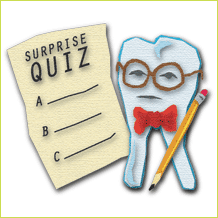What percentage of U.S. adults have cavities?
a. 56
b. 74
c. 85
d. 92
e. 99
b. 74
c. 85
d. 92
e. 99
Answer
d. 92 percent. Cavities can occur in adults as well as children. Because gums can recede as we age, older adults are more likely to have cavities at the gum line. Also, people who are on a lot of medication tend to develop dry mouth, which can make them more prone to cavities.
What can make teeth sensitive to food and cold?
a. Worn tooth enamel
b. Gum disease
c. Cracks in tooth
d. Worn fillings
e. All of the above
b. Gum disease
c. Cracks in tooth
d. Worn fillings
e. All of the above
Answer
e. All of these can make teeth sensitive. Talk to your dentist about treatment options, including desensitizing toothpaste, fluoride gel, a filling, or a crown.
If your tooth is knocked out, what should you do first?
a. Soak it in milk.
b. Gently rinse it off and try to reinsert in the socket.
c. Scrub it and remove any attached tissue.
d. Clean it with hydrogen peroxide.
e. Drink a glass of orange juice.
b. Gently rinse it off and try to reinsert in the socket.
c. Scrub it and remove any attached tissue.
d. Clean it with hydrogen peroxide.
e. Drink a glass of orange juice.
Answer
b. Gently rinse it off and try to reinsert in the socket. The American Dental Association recommends that you gently rinse off the root with water if it's dirty. (Be sure to hold the tooth by the tooth part, not the root.) Don't remove any tissue fragments or scrub the tooth. If you can, the ADA recommends reinserting the tooth in its socket. If you can't, put the tooth in milk. In any case, get to the dentist immediately for the best chance to keep the tooth.





